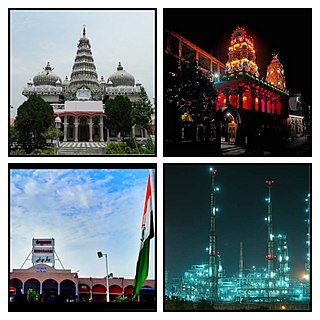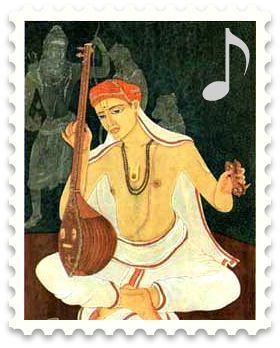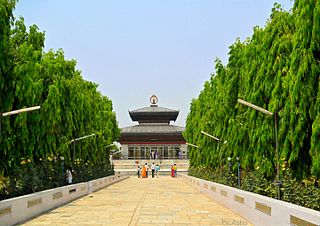
Bihar is a state in Eastern India. It is the third largest state by population, the 12th largest by area, and the 14th largest by GDP in 2021. Bihar borders Uttar Pradesh to its west, Nepal to the north, the northern part of West Bengal to the east, and Jharkhand to the south. The Bihar plain is split by the river Ganges, which flows from west to east.

Goramansingh also known as Gauramansingh is a small village in the Darbhanga district of Bihar, India. It is located approximately 62 kilometers east of Darbhanga and 12 kilometers east from its subdivisional headquarters of Biraul on the bank of the Kamala River in Bihar.

Begusarai is the industrial and financial capital of Bihar and the administrative headquarters of the Begusarai district, which is one of the 38 districts of the Indian state of Bihar. The district lies on the northern bank of the river Ganges in the Mithila region of India.

Bihar, a state of India, has produced musicians like Bharat Ratna Ustad Bismillah Khan and dhrupad singers like the Malliks and the Mishras along with poets like Pandit Dhareekshan Mishra, Bhikhari Thakur, the shakespeare of Bhojpuri and Vidyapati Thakur who contributed to Maithili Music. The classical music in Bihar is a form of the Hindustani classical music.

Chhath is an ancient Hindu festival native to the Indian subcontinent, more specifically, the Indian states of Bihar, Uttar Pradesh, Jharkhand and the Nepalese Autonomous provinces of Koshi, Madhesh and Lumbini. Prayers during Chhath puja are dedicated to the solar deity, Surya, to show gratitude for bestowing the bounties of life on earth and to request that certain wishes be granted.

Mithila, also known as Tirhut, Tirabhukti and Mithilanchal is a geographical and cultural region of the Indian subcontinent bounded by the Mahananda River in the east, the Ganges in the south, the Gandaki River in the west and by the foothills of the Himalayas in the north. It comprises certain parts of Bihar and Jharkhand of India and adjoining districts of the Koshi Province, Bagmati Pradesh and Madhesh Province of Nepal. The native language in Mithila is Maithili, and its speakers are referred to as Maithils.
Mithila culture or Maithil culture refers to the culture which originated in the Mithila region of the Indian subcontinent. Mithila comprises Tirhut, Darbhanga, Kosi, Purnia, Munger, Bhagalpur and Santhal Pargana divisions of India and adjoining provinces of Province No. 1, Bagmati Pradesh, and Madhesh Province of Nepal.

The cinema of Bihar, a state in eastern India, primarily consists of films in the Bhojpuri language. Bihar also has smaller Maithili- and Magahi-language film industries. Cinema in the state began during the early 20th century.
Ganga Maiyya Tohe Piyari Chadhaibo is a Bhojpuri film released in 1963 directed by Kundan Kumar. It was the first-ever Bhojpuri film, and starred Kumkum, Ashim Kumar and Nazir Hussain. It had music by Chitragupta, lyrics by Shailendra and songs sung by Lata Mangeshkar and Mohammad Rafi. The film is based on author Acharya Shivpujan Sahay's short story Kahani Ka Plot.
Bihari culture refers to the culture of the Indian state of Bihar. Bihari culture includes Angika culture, Mithila culture, Bhojpuri Culture and the culture of Magadha.

Malini Awasthi is an Indian folk singer. She sings in Bhojpuri, Awadhi and Hindi, She also presents Thumri and Kajri. The Government of India awarded her the civilian honour of the Padma Shri in 2016. She is known for her contribution in Bhojpuri music.

Deswa is a 2011 Indian Bhojpuri language film written and directed by Nitin Chandra. The film is a social drama - crime thriller Bhojpuri genre. The first film to be produced by actress Neetu Chandra. The film introduces new actors Ajay Kumar, Deepak Singh and Kranti Prakash Jha in lead roles along with critically acclaimed actor Pankaj Jha and Ashish Vidyarthi.

Angika is an Eastern Indo-Aryan language spoken in some parts of the Indian states of Bihar and Jharkhand, as well as in parts of Nepal.
Usha Kiran Khan was an Indian writer who worked in the Hindi and Maithili languages. She was also an academic historian.
Bindhyavasini Devi was an Indian folk musician. She was popularly recognised as Bihar Kokila. She was the founder of Vindhya Kala Mandir, a Patna based music academy promoting folk music, Vindhya Kala Mandir. The academy is associated with Bhatkhande University, Lucknow for 55 years now which is now run by her daughter-in-law Shobha Sinha, son Sudhir Kumar Sinha. She was born in Muzzafarpur in the Indian state of Bihar and specialised in Maithili, Bhojpuri and Magahi folk music. She also sang a popular song, Chhote Dulha Ke, in a movie, Vivah Geet and many of her songs have been released in CD format.
Kranti Prakash Jha is an Indian Bollywood actor, film producer, television personality, businessman and model from Begusarai, Bihar, best known for his roles of Santosh Lal in the 2016 Indian biographical sports film M.S. Dhoni: The Untold Story.

Chandan Tiwari is an Indian folk singer from Bihar. She is known as folk singer and sings in Bhojpuri, Nagpuri, Awadhi and Hindi. She was awarded Sangeet Natak Academy-Bismillah Khan Samman. She was honoured by Bhojpuri Kokila in Kolkata. BAG Films-News 24 awarded her best traditional folk singer. She appeared in India Today Magazine in cover story for her contributions to Indian folk music. She has been singing in various forms of folks like Purabi Sohar, Pachra Gandhi song, River Song, Chhath Song Kajri and Thumri.
Bhojpuri music is a form of Hindustani Classical Music and includes a broad array of Bhojpuri language performances in distinct style, both traditional and modern. This form of music is mostly created in Indian states of Bihar, Uttar Pradesh and other countries like Nepal, Trinidad and Tobago, Suriname, Guyana, Netherlands, Mauritius and other Caribbean Islands.

Dulari Devi is an Indian artist and illustrator, working in the Mithila art tradition. In 2021, she was a recipient of the Padma Shri, a civilian honour granted by the Government of India, for her contributions to art.













